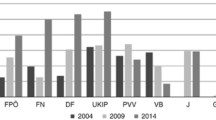Abstract
The European Parliament elections in 2014 ended in momentous gains throughout the continent for several groupings that have explicitly questioned the form, and even the very existence, of the European Union (EU) itself. This growth in discontentment presents a potentially formidable challenge to the integrationist agenda that has hitherto largely prevailed in Brussels. The orthodoxy that states could achieve so much more by working closely together is now under threat. So it is perhaps somewhat paradoxical that what are often labelled ‘Eurosceptics’, or self-identify as ‘Eurorealists’, have exploited the European Parliament as a major campaigning platform from which to express themselves. Moreover, these parties have achieved representation and thereby gained practical resources that have in turn helped them further mobilize support within their respective member states. Perhaps one of the few comforts for adherents to what was once the seemingly hegemonic Europhile consensus that still dominates the Council of Ministers and European Commission is that the various sceptical forces ranged against them are ideologically divided and agree on little save their desire to hasten the end of the euro, the EU or both. This chapter considers messages produced and disseminated by the various sceptical parties during the 2014 elections, specifically through examination of their own political advertisements. The primary focus is on parties that have been labelled as ‘radical right’. The rise to prominence and 2014 campaigns by leading members of these tendencies will be discussed, with a focus on the Freedom Party of Austria, the UK Independence Party and the Hungarian nationalist Jobbik.
Access this chapter
Tax calculation will be finalised at checkout
Purchases are for personal use only
Similar content being viewed by others
Notes
- 1.
See European Parliament, 2015 http://www.europarl.europa.eu/elections2014-results/en/country-results-at-2014.html.
- 2.
See BBC, 2006 http://news.bbc.co.uk/1/hi/4875026.stm.
- 3.
See BBC, 2003 http://news.bbc.co.uk/1/hi/uk_politics/3307487.stm.
References
Baker, D., & Seawright, D. (1998). Britain for and against Europe: British politics and the question of European integration. Oxford: Oxford University Press.
Bársony, F., Gyenge, Z., & Kovács, Á. (2011). Kit érdekelnek a programok? A Jobbik kisebbségképe és annak médiareprezentációja a 2010-es országgyűlési választások kampányidőszakában. Médiakutató, 12(1). Accessed 12 December 2014.
Fallend, F. (2004). Are right-wing populism and government participation incompatible? The case of the freedom Party of Austria. Representation, 40(2), 115–130.
Ford, R., Goodwin, M. J., & Cutts, D. (2011). Strategic Eurosceptics and Polite Xenophobes: Support for the UK Independence Party (UKIP) in the 2009 European Parliament Elections. European Journal of Political Research, 51(2), 204–234.
Ford, R., & Goodwin, M. J. (2014). Revolt on the right. London: Routledge.
Frölich-Steffen, S. (2004). Die Identitätspolitik der FPÖ: Vom Deutschnationalismus zum Österreich-Patriotismus. Österreichische Zeitschrift für Politikwissenschaft, 33(3), 28–295.
Hajdú, A. (2014). A magyar radikális jobboldali képviselők két generációja (A MIÉP és a Jobbik parlamenti képviselőinek összehasonlítása). Politikatudományi Szemle, 23(2), 59–86.
Jackson, D., Thorsen, D., & Wring, D. (eds.). (2016). EU referendum analysis 2016: Media, voters and the campaign. Bournemouth: Bournemouth University.
Karácsony, G., & Róna, D. (2010). A Jobbik titka: A szélsőjobb magyarországi megerősödésének lehetséges okairól. Politikatudományi Szemle, 19(1), 31–63.
Krzyżanowsky, M. (2013). From anti-immigration and nationalist revisionism to Islamophobia: Continuities and shifts in recent discourses and patterns of political communications of the Freedom Party of Austria (FPÖ). In R. Wodak, B. Mral, & M. Khosrahvnik (eds.), Right-Wing populism in Europe: Politics and discourse. London: Bloomsbury, 135–148.
Luther, K. R. (2007). Electoral strategies and performance of Austrian right-wing populism, 1986–2006. Keele European Parties Research Unit, Working Paper 24. Online retrieved from https://www.keele.ac.uk/media/keeleuniversity/group/kepru/KEPRU%20WP%2024.pdf.
Lynch, P., Whitaker, R., & Loomes, G. (2012). The UK Independence Party: Understanding a Niche Party’s strategy, candidates and supporters. Parliamentary Affairs, 65(5), 733–757.
McGann, A. J., & Kitschelt, H. (2005). The radical right in the Alps. Party Politics, 11(2), 147–171.
Meret, S. (2010). The Danish people’s party, the Italian Northern league and the Austrian freedom party in a comparative perspective: Party ideology and electoral support. (SPIRIT PhD Series; No. 25). Aalborg: Institut for Historie, Internationale Studier og Samfundsforhold, Aalborg Universitet.
Nábelek, F. (2014). Negatív kampány a pártok közvetlen kommunikációjában Magyarországon. Politikatudományi Szemle, 23(4), 92–114.
Pelinka, A. (2002). Die FPÖ im internationalen Vergleich. Zwischen Rechtspopulismus, Deutschnationalismus und Österreich-Patriotismus. Conflict & Communication Online, 1(1), 1–12.
Pelinka, A. (2005). Right-wing populism plus ‘X’: The Austrian Freedom Party (FPÖ). In D. Caramani & Y. Mény (eds.), Challenges to consensual politics: Democracy, identity, and populist protest in the Alpine Region (pp. 131–146). Brussels: Peter Lang.
Plasser, F., & Ulram, P. A. (2000). The changing Austrian voter. Centre for Applied Political Research, Vienna. Online retrieved from http://www.demokratiezentrum.org/fileadmin/media/pdf/austrianvoter.pdf.
Schedler, A. (1996). Anti-establishment parties. Party Politics, 2(3), 291–312.
Szczerbiak, A., & Taggart, P. (eds.). (2008). Opposing Europe? The comparative party politics of Euroscepticism. Oxford: Oxford University Press.
Tóth, A., & Grajczjár, I. (2009). Miért olyan sikeresek a radikális nemzeti-populista pártok nagy társadalmi-gazdasági válságok idején?. Politikatudományi Szemle, 18(3), 7–29.
Tóth, A., & Grajczjár, I. (2012). A nemzeti radikalizmus. A jobboldali radikalizmus negyedik hulláma Magyarországon. In Boda, Z., & Körösényi, A. (Eds.), Van irány? Trendek a magyar politikában (pp. 83–108). Budapest: Új Mandátum Könyvkiadó.
Van Den Brug, W., Fennema, M., & Tillie, J. (2000). Anti-immigrant parties in Europe: Ideological or protest vote. European Journal of Political Research, 37(1), 77–102.
Várnagy, R. (2010). Jelöltállítás a 2009-es Európai Parlamenti Választásokon. Politikatudományi Szemle, 19(4), 9–24.
Whitaker, R., & Lynch, P. (2011). Explaining support for the UK Independence Party at the 2009 European Parliament Elections. Journal of Elections, Public Opinion & Parties, 21(3), 359–379.
Author information
Authors and Affiliations
Corresponding author
Editor information
Editors and Affiliations
Copyright information
© 2017 The Author(s)
About this chapter
Cite this chapter
Wring, D., Grill, C., Merkovity, N., Deacon, D. (2017). Populist Politics and the ‘Radical Right’ in 2014 Elections. In: Holtz-Bacha, C., Novelli, E., Rafter, K. (eds) Political Advertising in the 2014 European Parliament Elections. Palgrave Macmillan, London. https://doi.org/10.1057/978-1-137-56981-3_7
Download citation
DOI: https://doi.org/10.1057/978-1-137-56981-3_7
Published:
Publisher Name: Palgrave Macmillan, London
Print ISBN: 978-1-137-56980-6
Online ISBN: 978-1-137-56981-3
eBook Packages: Literature, Cultural and Media StudiesLiterature, Cultural and Media Studies (R0)




